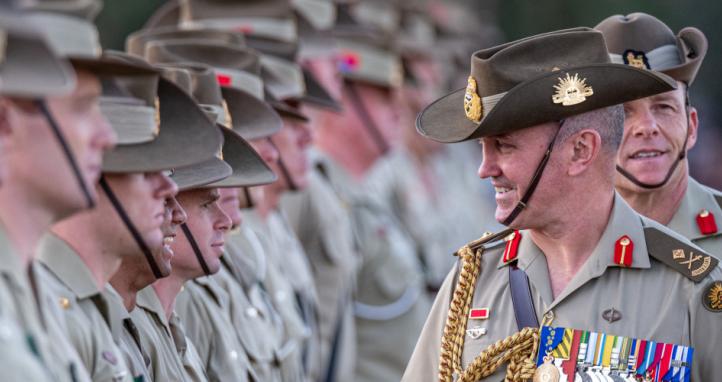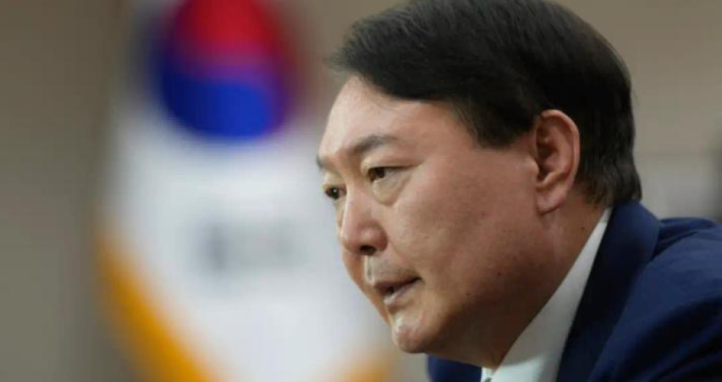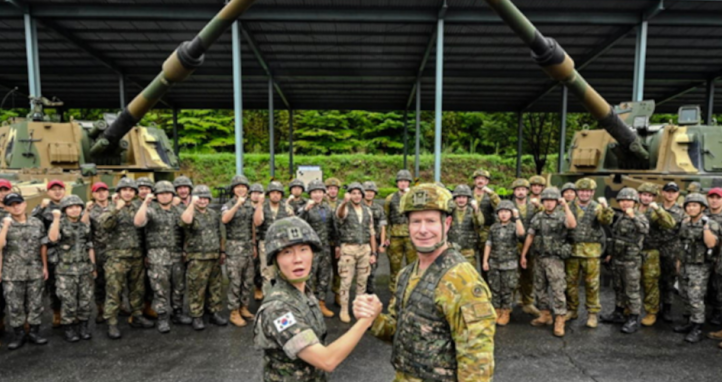In the Army, where high-performance and resilience is demanded, maintaining the mental health of personnel is incredibly important to ensure wellbeing. The Army, committed to defending Australia’s national interests, cannot afford to neglect the mental wellbeing of its personnel. Yet, regrettably, despite its significance, mental health stigma continues to persist within the Army's culture, preventing those in need from seeking the crucial support they genuinely require.
After personally enduring considerable trauma and currently managing a combination of physical and non-physical chronic injuries/illnesses because of service, I have started to observe individuals who disregard the needs of those struggling with mental health illness. This is either due to an ignorance surrounding the issue or the fact someone simply isn't trained to deal with it. The latter is most likely a general observation. When it comes to mental health, unless you have lived experience or have a background in medical knowledge, it is incredibly difficult to understand or know how to approach the issue.
Hence, the aim of this article is to explore mental health stigma in the Army, along with possible strategies to address this important issue.
History of Mental Health Stigma in the Army
The roots of mental health stigma in the Army can be traced back to historical beliefs concerning mental illnesses. Previously, soldiers who displayed symptoms of depression, anxiety, or post-traumatic stress disorder were labelled as cowardly and seen as a burden to society, fostering a culture that discouraged seeking help.
It is important to acknowledge that the Army has made significant strides in monitoring the mental health of its personnel, with commanders offering guidance for early intervention and optimal rehabilitation in the face of adversity. Unfortunately, generational and outdated beliefs ingrained in the military's ethos continue to contribute to the persistence of mental health stigma today.
If you have gotten this far, well done and thank you. If this article is making you feel uncomfortable – this is also ok. like all habits, the desensitisation from talking about mental health won’t happen overnight. But these conversations need to be had, so that awkwardness or eagerness to stop, that is a very normal feeling can be overcome. Please continue, this article is not all doom and gloom – there is light at the end of the tunnel.
Perception of Weakness and Professional Consequences
The modern Army continues to face challenges regarding mental health stigma, largely driven by the perception that seeking support signifies weakness. The military culture places significant emphasis on strength, resilience, and self-reliance; fostering the belief that acknowledging mental struggles could potentially harm one's professional reputation and hinder career advancement.
Consequently, many soldiers silently endure their emotional pain for years, choosing not to confront their inner struggles due to the fear of judgment and adverse repercussions. Often with the belief that acknowledging their need for support will jeopardise their entire career, though this is not the case. I'd argue there is a higher likelihood of halting your career during sports parade than there is seeking mental health support.
Fear of Losing Trust
Within the close-knit and high-stress setting of the Army, the bond of camaraderie among soldiers is of great significance. However, those facing mental health illnesses may hesitate to share their thoughts and struggles to their follow soldiers, fearing it could lead to a loss of trust and exclusion from the group.
This fear of rejection further isolates individuals dealing with mental health challenges, creating barriers that hinder them from receiving the crucial help and support they truly require. On the other hand, a fellow soldier might avoid approaching someone struggling with a mental health illness out of fear of saying the wrong thing and exacerbating the situation. So, are our soldiers even equipped to deal with service-related mental health illnesses? Of course not, unless you’ve been trained, how could you be?
Limited Mental Health Resources and Accessibility
The mental health services provided by the Army and the greater community may prove insufficient to meet demand, resulting in prolonged waiting periods and inadequate support. Moreover, soldiers stationed in remote localities or combat zones may encounter difficulties in accessing essential mental health resources. These limitations can exacerbate the existing stigma, as soldiers might perceive seeking help as a burden and present a nagging/selfish attitude, further discouraging them from asking for help.
The Role of Leadership
The role of Army leaders in shaping the culture and attitudes towards mental health is crucial, right down to the senior digger. As the backbone of military units, leaders significantly impact the wellbeing of their troops. When leaders prioritise mental wellbeing and openly discuss its importance, it sends a powerful message to their subordinates, encouraging them to recognise the significance of mental health and seek support when needed.
On the flip side, neglecting or downplaying mental health concerns can lead to detrimental effects on the unit, as soldiers may suppress their struggles due to the stigma associated with seeking help. How leaders respond to mental health challenges within their ranks also sets the tone for how soldiers perceive and approach such issues.
If your direct chain of command lacks the emotional intelligence to identify and openly speak of the wider issue, why would a subordinate approach them for guidance. The subordinate struggling would simply resent their commander, seeking guidance elsewhere, further fracturing the unit.
Stigmatising those who seek help fosters a toxic culture of silence and shame, while promoting a supportive and empathetic culture encourages open dialogue and reduces the stigma, leading to better cohesion. Leaders who lead by example and care for their own mental wellbeing inspire their subordinates to do the same, making it easier for soldiers to seek help without fear of judgement. Fostering a culture of resilience and empathy for mental health within the military requires consistent efforts from leaders at all levels, including education, access to resources, and encouraging open conversations about mental wellbeing.
Ultimately, when leaders prioritise mental wellbeing, it enhances not only the individual lives of soldiers but also the overall operational readiness and effectiveness of the entire Army. The modern workforce requires every leader – irrespective of rank – to receive training in handling mental health crises, eliminating the practice of assigning a single individual for this purpose in a unit.
Impacts of Mental Health Stigma on Soldiers
The repercussions of mental health stigma in the Army extend far and wide. Soldiers who lack proper support may face a decline in job performance, increased absence, and a higher risk of developing chronic mental and physical health conditions. Furthermore, untreated mental health issues can lead to more severe outcomes including alcohol dependency, substance abuse, self-harm, and as we are all aware – suicide.
Additionally, the overall readiness and effectiveness of units and the wider Army can be compromised when a significant portion of the force is grappling with mental health challenges without receiving appropriate care.
Efforts to Reduce Mental Health Stigma
Acknowledging the importance of confronting the stigma surrounding mental health, the Army has taken proactive measures to tackle this concern. They have implemented a range of initiatives to combat the issue, with an increasing focus on training programs aimed at promoting mental health awareness and destigmatisation for not just the serving member, but their family as well.
Furthermore, organisations external to the Army such as Open Arms have launched programs highlighting the stories of soldiers who sought help for mental and physical health issues and successfully triumphed over their challenges. The objective of these programs is to challenge negative perceptions, fostering an environment where seeking assistance is encouraged and normalised for others facing similar issues.
Promoting Mental Health as a Core Component of Readiness
Promoting mental health as a core component of readiness in the Army is imperative for enhancing overall mission effectiveness and soldier well-being. This would subsequently lead to a transformative shift in the organisations culture and diminish the stigma. A resilient and mentally fit force ensures better decision-making, adaptability, and cohesion during challenging situations.
Implementing comprehensive mental health programs that focus on prevention, early intervention, and the destigmatisation of seeking help is vital. Providing accurate information about mental health care and dispelling myths surrounding career implications among serving members can encourage those in need to seek early intervention and enable prompt treatment. Offering accessible counselling, stress management training, and peer support initiatives through Open Arms and other not-for-profits can foster a supportive environment.
Peer support involves engaging with individuals who are willing to share their lived experiences. Real success stories hold more value than mere online courses and PowerPoints as they are more tangible. Regular mental health screenings and assessments are essential for early detection and timely intervention. By prioritising mental health, the Army can create a stronger and more prepared force, ready to face any adversity.
Conclusion
The persistence of mental health stigma within the Army is a pressing matter, impeding soldiers from obtaining the necessary support to confront their mental health difficulties and further leading to a loss of life through suicide. Confronting this challenge demands a united endeavour involving leaders, soldiers, and the organisation as a cohesive whole.
By nurturing a culture that prioritises mental health, encourages open communication, and ensures easy access to resources, the Army can empower its soldiers to seek assistance – ultimately fostering improved well-being and operational effectiveness. In the battle against these unseen adversaries, the Army can wholeheartedly champion the mental health of its dedicated personnel, offering unwavering support and protection for all.





1. Leadership. If pers do not have confident that leaders are skilled in dealing with this issue, they will not reveal their mental health challenges.
2. Isolation. Polices and processes should not isolate the person, medically downgrade them, assume they cannot do anything and alienate them from peers. This ostracizes the member and makes it clear to everyone the member has mental health issues.
3. Career. We need to stop removing opportunities for people that are working through mental health challenges – this just prevent them seeking help.
4. UB Needs to stop. Telling someone who is working on their mental health that they lack resilience is not helpful. When bystanders observe leaders targeting those with mental health challenges, they need to speak up.